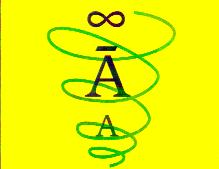Dion presented the DVD
program “Enemies of Science (Part 2), in which Richard Dawkins challenges
“superstitious” beliefs and behaviours stemming therefrom, in this
case relating to “supplementary therapies” (also, loosely known
as “alternative medicine” or “complementary therapies” etc). The
following are some notes of your scribe (RJ); certainly not representing
the views of all participants, or of the AGS:
a. Dawkins had quite
a gentle but strongly mocking style of interviewing practitioners
of various complementary therapies, listening carefully to their
claims and acknowledging some benefits (“Oh yes, this massage feels
beneficial for me … !”). We savoured claims like “If you see inside
this pearl, you could find out who you really are.”, and noted that
it’s unlikely to e a particularly accurate map-territory relationship.
b. I loved the one where
a “waving of hands” process was to increase the subject (Dawkins)’s
number of DNA strands from two to twelve in a matter of weeks, with
unspecified benefits. The twelve strands were to be arranged as
four triangles, pointing inwards. Sadly, Dawkins did not appear
to explore the mechanism of this process, or undergo later testing
to determine the outcome.
c. Apparently one-third
of the UK population spend 1,200,000 pounds sterling (I don’t have
a “pound” key) on “alternative therapies”, so it is big business.
However, there was no definition of “alternative therapies” offered
during the program. I wonder if the plethora of massage techniques,
for example, are mainstream or alternative.
d. One example that fermented
debate was the decline in vaccinations in Britain, Australia and
elsewhere, due to diminished public concern for diseases such as
whooping cough and polio, and occasional (largely unwarranted) scares
about possible side effects. We (“the public”) are not good at managing
medical risks such as balancing the risk of vaccination side-effects
against the risk of getting the disease.
e. We loved Dawkins’
admonishment “We should be open-minded, but not so open-minded that
our brain falls out!”
f. We generally agreed
that “Individual scientists may be honest or dishonest, competent
or incompetent, but the discipline of Science, with its safeguards
of peer review and testing of evidence, is incomparably competent
at achieving verifiable outcomes.”
g. I agreed with Dawkins’
repugnance for the use of well-defined terms for vague and misleading
purposes (“vortex”, “energy centres”, “magnetism of personal attraction”
etc).
h. I thought that Deepac
Chopra handled Dawkins’ challenge quite well. He suggested that
expressions like “quantum effect” applied to spiritual phenomena
were really a metaphor rather that a literal mapping of the ineffable
– “Mechanistic science is inadequate.”
i. Homeopathy received
a particular grilling. Dawkins pointed out that a 10C dilution of
a beneficial supplement is “roughly” equivalent to not a drop in
the ocean, but more like a drop in the Solar System. So a spoonful
would not normally include even a single molecule of the active
ingredient.
j. There was some indignation
expressed about the unfair disparity in requirements for testing
of new medicines (years of double-blind trials, millions of pounds),
as opposed to homeopathic remedies.
k. The power of the placebo
was considered and discussed at some length – How much of our real
healing really comes from our own state of mind-emotion?
l. In essence: “Skeptical,
rational enquiry is always the best approach”.

